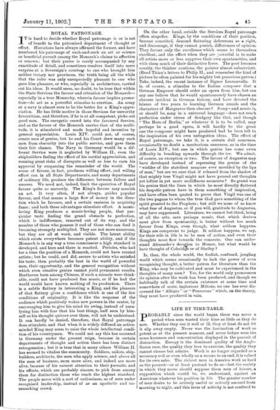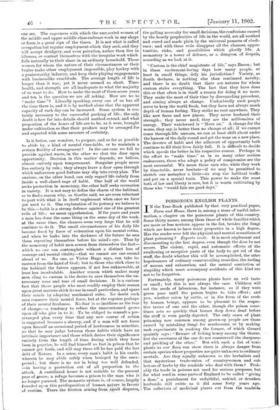LIFE BY TIME-TABLE.
PROBABLY since the world began there was never a period when men wasted their time as little as they do now Whether they use it well or ill, they at least dO not let it slip away-empty. Never was the fascination of work so potent as at the present moment, and never before were the same keenness and concentration displayed in the pursuit of distraction. Energy in the dominant quality of the Anglo- Saxon race, the quality they love to exercise, the quality-they cannot choose but admire. Work is no longer regarded as a necessary evil or even wholly as a means to an end, it is valued for its own sake. The richest men in America work as hard as the poorest—Or at least pretend to do so—lest the. society in which they move should suppose them men of leisure, a supposition which would be, we understand, against an Athericia whatever his position in life. ' The greater number of inendesire to be actively useful:Or actively amused froth morning to night, and this fever of activity is not confined to
one sex. The eagerness with which the unmarried women of the middle and upper middle class embrace work in any shape or form is a great sign of the times. It is not what is called occupation but regular employment which they seek, and they will accept drudgery, and even privation, rather than live in idleness, or content themselves with the irregular work which falls naturally to their share in an ordinary household. Those women for whom the nature of their circumstances or their brains make other employment impossible, play hockey with a praiseworthy industry, and keep their playing engagements with businesslike exactitude. The average length of life is longer than it was ; yet it never seemed so short. Time, health, and strength are all inadequate to what the majority of us want to do. How to make the most of three-score years and ten is the question we are all asking. How are we to "make time "? Literally speaking, every one of us has all the time there is, and it is by method alone that the apparent capacity of each day can be increased. Some system is cer- tainly necessary to the successful packing of life ; the only doubt is how far into details should method extend, and what proportion of the hours of life are to be, as it were, brought under cultivation so that their produce may be arranged for and expected with some measure of certainty.
Is it better, one wonders, to prepare, and as far as possible to abide by, a kind of mental time-table, or to maintain a certain fluidity of arrangement? In the one case we fail to provide against waste, in the other we shut the door upon opportunity. Decision in this matter depends, we believe, -almost entirely upon temperament. Sanguine people never live entirely by rule ; they always leave a door open through which unforeseen good fortune may slip into every plan. The anxious, on the other hand, can only regard life calmly from inside a well-closed cage of habit. One half of the world seeks protection in monotony, the other half seeks recreation in variety. It is not easy to define the charm of the habitual, or to find a reason why, as Goethe said, we are even reluctant to part with what is in itself unpleasant when once we have got used to it. One explanation of its potency we believe to be this.--habit is a strong defence against one of the greatest evils of life ; we mean apprehension. If for years and years a man has done the same thing on the same day of the week, at the same time, the chances seem very large that he will continue to do it. The small circumstances of his daily life become fixed by force of reiteration upon his mental retina, and when he looks into the darkness of the future he sees them repeating themselves before his mind's eye. Thus by the monotony of habit men screen from themselves the fact— which no one can contemplate without a distinct loss of courage and mental vitality—that we cannot see one second ahead of us. No one, as Victor Hugo says, can take to- morrow from the hand of God ; but to those who stick close to the habitual the future appears, if not less unknowable, at least less incalculable. Another reason which makes many men cling to custom is the desire to save themselves the un- necessary wear and tear of small decisions. It is a curious fact that those people who most readily employ their reason upon great matters shirk its use in small particulars, and spare their minds by adopting mechanical rules. No doubt such men conserve their mental force, but at the expense perhaps of their mental freshness. No fear is so insidious as the fear of change,—a tendency to refuse the unaccustomed grows upon all who give in to it. To be obliged to consult a pre- arranged plan every time that any new course of action is suggested becomes a slavery, and if a man will not force upon himself an occasional period of lawlessness in minutiae, so that he may judge between those habits which have an intrinsic importance and those which derive their significance entirely from the length of time during which they have been in practice, he will find himself so fast in prison that he cannot get forth, and will stay there till he has paid the last debt of Nature. In a sense, every man's habit is his castle, wherein he may abide safely when besieged by the unex- pected ; but there is no use in being too well defended, —in having a protection out of all proportion to the attack. A castellated house is not suitable to the present year of grace; a refuge becomes a prison to the man who is no longer pursued. The monastic system is, of course, largely founded upon this predisposition of human nature in favour of routine. There the friction arising front sAnall disputes,
the galling necessity for small decisions, the confusions caused by the hourly-perplexities of life in the world, are all soothed and cured and made plain by the universal panacea of obedi- ence ; and with these evils disappear all the chances, oppor- tunities, risks, and possibilities which glorify life. A. monastery is a tower of defence, or a dungeon of despair, according as we look at it.
" Custom is the chief magistrate of life," says Bacon ; but in these excitement-loving days how many people, at least in small things, defy his jurisdiction ? Variety, as South declares, is nothing else than continued novelty, and there is no doubt that there are natures for whom custom stales everything. The fact that they have done this or that often is in itself a reason for doing it no more. They make the most of their time by disregarding precedent, and aiming always at change. Undoubtedly such people serve to keep the world fresh, but they have not always much depth of human feeling. They strike no root anywhere. They like new faces and new places. They never husband their strength ; they never need, they are the millionaires of energy. Their watchword is " Move on." A change for the worse, they say, is better than no change at all; if we cannot come through.life unworn, we can at least shift about under the harrow of the daily round and get the wear on a new place. The devotee of habit and the adherent of opportunity both continue to fill their lives fairly full. It is difficult to decide which speeds the better in his respective course. Perhaps in the effort to "make time," as in so many other serious endeavours, those who adopt a policy of compromise are the most successful. We mean those men who, while they work by time-table, never hesitate—if we may be permitted to stretch our metaphor a little—to stop the habitual traffic and put on a special train. This power to make the most both of law and liberty is rare, but it is worth cultivating by those who "would fain see good days."







































 Previous page
Previous page